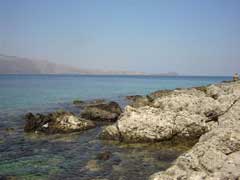 Sustainable management of scarce resources in the coastal zone
Sustainable management of scarce resources in the coastal zone
- The coastal zones of the Mediteranean are undergoing rapid development
with growing and conflicting demands on the natural resources and at the
same time subject to often irreversible degradation of these resources and
thus the very basis for development.
- Water resources and the related land use issues are a key element for the
sustainable development of coastal regions.
- They illustrate the dependency of the usually dynamic and fast growing
coastal areas on their resource catchment. This project will explore methods
and tools for long-term policy analysis and strategic decision support for
integrated coastal development with special emphasis on water resources and
land use and the resource balance between the coastal region and inland
areas.
| Project number | ICA3-CT-2002-10006 | ||
|---|---|---|---|
| Subject(s) | AGRICULTURE , no translation available , no translation available | ||
| Acronym | SMART | ||
| Geographical coverage | Austria, Australia, Egypt, France, Italy, Jordan, Lebanon, Portugal, Turkey, Tunisia | ||
| Budget (in €) | 1104619 | ||
| Programme | INCO MED (FP5) | ||
| Web site | http://www.ess.co.at/SMART/ | ||
| Objectives | - SMART addresses a number of specific scientific objectives: * To build, and test in a number of parallel comparative case studies, and consistent and well integrated set of tools for the design, analysis, and effective communication of policies for integrated coastal zone management. * To develop a generic approach to combine engineering analysis with socio-economic considerations in a unifying and consistent multiple-criteria framework. * To link, through expert systems technology, quantitative simulation models water resources and hydrological models with policy oriented qualitative assessment. * To integrate expert systems technology with complex simulation models to improve their applicability in data poor and data constrained application situations. * To develop appropriate tools and methods for the communication of complex technical information to a broad range of participants and stake holders in the policy making process, primarily based on Internet technology. * To develop formal methods of rule-based aggregation and disaggregation of data and information to span the entire range from data to indicators or criteria, and issues. |
||
| Results | - The overall objective of the SMART project was to develop, implement and
test a new, participatory but scientifically sound and rational approach to
planning and management of the coastal zone that can help to reconcile
conflicting demands on scarce water. In essence, the project is concerned
with testing a strategy for solving water demand conflicts. - The development of this approach begins with the integration of three primary components, a socio-economic framework, and two quantitative analysis tools: WaterWare and TELEMAC. The resulting methodology was used to simulate scenarios for the assessment of water supply and water demand with reference to Integrated Coastal Zone Management methods. - Together, these models have aimed to integrate environmental impacts, costs, access, and equity, in a systemic way. Their outputs will be assessed by a rule-based expert system and used to formulate recommendations for conflict resolution that favor sustainability over time. Participation of selected stakeholders from water management institutions was used in testing the approach and in identifying best water management practice. - This ‘SMART’ methodology was applied to five case studies in the Mediterranean coastal zone in the countries of Turkey, Lebanon, Jordan, Egypt and Tunisia. - This requirements and constraints report presents a comprehensive list of issues, that are to be developed through the socio-economic analysis in WP02, provide the conceptual framework for the case studies and the scenarios explored in WP05 to 09, and applied in the comparative assessment in WP10. It lists the data requirements for the methods proposed in WP03, analyses what is known about local data availability, describes the resulting constraints and suggests alternative approaches where necessary. - Sustainability is an umbrella concept that is explored in the SMART project by calculating a daily water budget for a given area and studying water supply and water demand over time and space, from a multi-disciplinary perspective. Within this context, key water issues for each case study have been complemented with key issues of change that are likely to have an impact on the water system in the future. |
||
| Period | [01/09/2002 - 31/08/2005] | ||
 you are not logged in
you are not logged in





